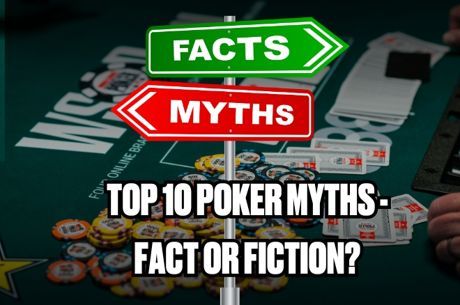PokerNews Book Review: Decide to Play Great Poker by Annie Duke

When I had the opportunity to play in the Media Event at this year��s World Series of Poker, I was pretty excited. Although it was free and there was no bracelet to be had, it was the one opportunity for those of us in the media to relax, sit back, and enjoy each other��s company while playing a little poker. In addition, some major bragging rights were on the line. As fate would have it, I was eliminated early on, while Annie Duke went on to win the one and only event she played at the 2011 WSOP.
Now, you��re probably thinking, Duke isn��t a member of the media, she is the commissioner of the Epic Poker League. I suppose an argument could be made either way, but I will say that the media members in the tournament didn��t seem to mind, especially because she was kind enough to gift everyone a copy of her new book, Decide to Play Great Poker (DTPGP). In actuality, the book was a collaboration between Duke and John Vorhaus, who has written many popular poker book. Duke contributed the ideas and material, relying on Vorhaus to present it in a clear and concise manner. While I��m not much for poker-strategy books, my curiosity was peaked when Duke navigated the minefield that was the Media Event (the structure was an ultra-turbo) to claim the first-place prize (an iPad 2 that she generously donated to charity). Tired of losing, I decided then and there it was time to start playing great poker.
DTPGP is strategy guide for no-limit Texas hold��em, as opposed to a book like Jerry Yang��s All-In (click here for a review of that book), which is a narrative. I��ve literally read dozens of strategy books in the past few years, and finding one worthwhile is a rare event. Needless to say, I was skeptical about DTPGP and expected it to be another run-of-the-mill strategy manual. Luckily, my bias was immediately swayed when I read the opening sentence to Chapter 1: ��The First Rule is There are No Rules.��
As someone who has read almost every strategy book on the shelf, I can tell you that most are characterized by reiterating endless rules for poker. Never limp under the gun, if you��re first to enter a pot, always come in raising, steal the blinds, etc. While this is good advice, there are no hard and fast rules to poker because it is completely subjective to your situation and opponents. DTPGP not only recognizes this fact, but it uses it as the basis for the book. Instead of advocating memorization and regurgitation of rules, Duke throws the mechanics of the game out the window and instead focuses her attention on the thought processes and strategies required for poker success.
Here��s a quick look at a few DTPGP chapters:
- The Art of Adjustment
- The Religion of Position
- Flopping Huge
- Bluffing
- River Play In/Out of Position
- Management (money management, ego management, and life management)
Now, I know what you��re thinking: "I��ve heard about the importance of all those topics in every strategy book I��ve ever read." That��s what I thought when I skimmed DTPGP's index and saw the chapter titles. However, I am here to tell you that while other books cover these topics in depth, they tend to tell you the what, when, where, and how of things. DTPGP sets itself apart from other poker books by focusing on the missing link, which happens to be the most important, �� the ��why�� of poker.
Why did you put in that raise? Because a book told you to raise from the button when action folded around to you? Although that is the correct move more times than not, if you don��t understand the strategy and thinking behind such a play, you��re simply going through the motions of any ignorant donkey. As the book says: ��DTPGP teaches you how to identify and analyze those variables, interchange them within basic game-situation templates, and become knowledgeable, comfortable, and confident in any poker situation.��
The illusions of rules are given in DTPGP, no doubt, but it is important to recognize that the book is designed to get you thinking about general concepts that should not be mistaken for steadfast rules. While reading the book, you might think Duke is telling you what to do, but by the time you��re done, you��ll look back and realize that instead of telling you the how, she��s graciously provided you both the how and why. Knowledge is power, especially in poker.
One of the things I liked best about this book was that while it was a guide for no-limit hold��em, it was neither pertinent strictly to tournaments nor to cash games. The book tends to use tournament situations in its examples, but it soon becomes apparent that the information and tactics can also be applied to ring games. Finding a book applicable to both variations of the game is rare indeed.
Another thing that I liked about the book was the emphasis on how the smallest of intricacies should be reflected in your decision-making process. Duke uses some great hand examples to demonstrate this point, showing you how something as small as an untextured board versus a textured board will have colossal ramifications on the hand. DTPGP encourages you to examine your game down the minutest detail, making you confront your decision-making abilities for better or worse. For me, I discovered some consistent mistakes in my thought process, and while it was a bitter pill to swallow, I��m grateful for the opportunity to catch them before they ended up costing me more money.
On the other hand, I��m not as grateful that DTPGP will be doing the same for others. Making fewer mistakes is great for my bottom dollar, but the fewer mistakes my opponents' make is not. It was then that I realized the power of DTPGP. That was also the moment I cursed Duke��s name. Not to sound overly dramatic, but I suddenly wasn't happy that she released such a powerful book ensuring that the thought processes, strategies, and secrets that set superior players apart from the masses was now available to every Tom, Dick, and Harry. I was suddenly transported back in time when similar cries of panic arose over Doyle Brunson��s Super System.
When he released his book in 1979, poker professionals criticized Brunson for giving away their secrets and taking away their edge in the game. Drawing a comparison between DTPGP and Super System may be bold, but I��m comfortable doing just that. It��s been 30 years since the publication of Super System, and poker has changed considerably in that time. While DTPGP may not revolutionize the game to the degree of Super System, it is the most modernized text applicable to the game. In other words, no other book on the market today can do more for your game than DTPGP (Admittedly, beginners may want to use it in conjunction with a text that explains the mechanics of the game. I recommend Harrington on Hold��em).
To get your copy of Decide to Play Great Poker, visit Amazon.com today.
Have you read Decide to Play Great Poker by Annie Duke? If so, give us your thoughts in the comments section below. In the meantime, be sure to follow us on Twitter and like us on Facebook.
*Photo courtesy of AnnieDuke.com








